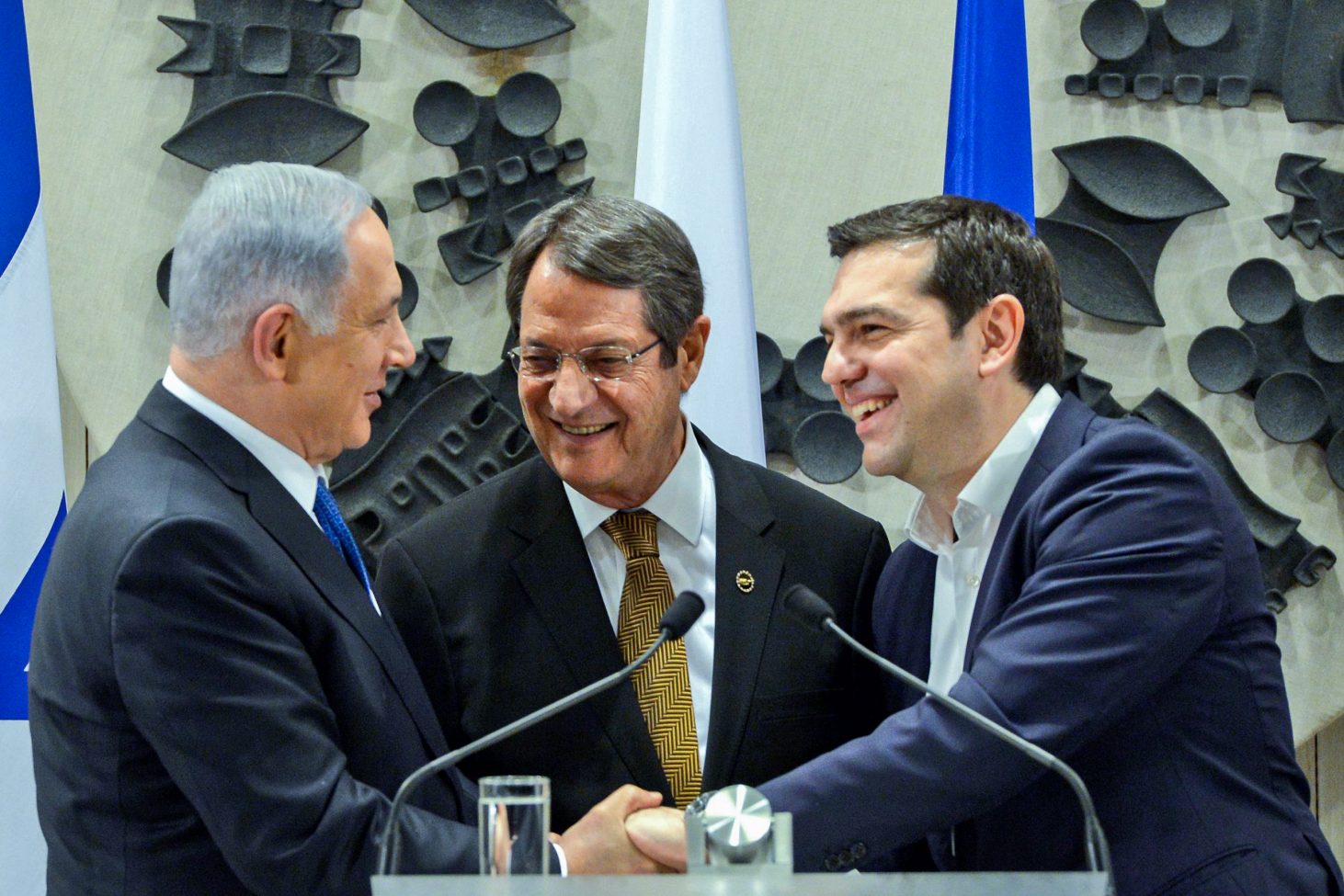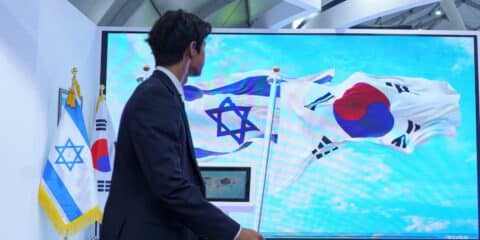A Framework for Security and Economic Cooperation: “3+3”
Israel is part of the Mediterranean community, both in strategic terms and in many aspects of the country’s culture and its way of life. Translating this into a new regional security architecture is in Israel’s national interest. Indeed, since 2016 a format of trilateral meetings has emerged in the Eastern Mediterranean: the leaders of Greece and Cyprus have met with the Prime Minister of Israel, as well as with the leaders of Egypt and Jordan. These should be the building blocks for a new informal forum that can also include Italy, as part of a “3+3” consultative framework – Italy, Greece and Cyprus; Israel, Egypt and Jordan – modelled on the Western Mediterranean Forum.
The new tripartite pattern
The pattern of trilateral meetings between the countries in the Eastern Mediterranean which has taken shape over the past two years is the outcome of a joint initiative on the part of the two Hellenic leaders: Greek Prime Minister Alexis Tsipras and Cypriot President Nicos Anastasiades.
It is remarkable that they are closely aligned despite their ideological differences. Anastasiades belongs to the Center-Right while Tsipras is firmly embedded in the radical Left. Together, they have built close relations with Egyptian President Abdel Fattah el-Sisi, and met him for five trilateral meetings. The most recent one took place in Nicosia in November 2017. In parallel, there have been three summit meetings in this format with the Prime Minister of Israel (in Nicosia, Jerusalem and Saloniki). A fourth meeting, which was meant to take place in early January 2018, was deferred as a result of domestic political constraints that prevented Netanyahu from leaving Israel).
A similar format is beginning to take shape with King Abdullah of Jordan, and a trilateral summit took place with him in Nicosia in January 2018. In theory, Greece and Cyprus also are committed to talks in a similar format with Lebanon and with the Palestinians, although these have yet to take place.
These trilateral meetings have regularly concluded with long and detailed joint statements, which emphasize the potential for cooperation in the Eastern Mediterranean. They also relate to a shared historical heritage and describe the variety of endeavors actually being undertaken, with emphasis on the economic domain and the exploitation of energy resources. They explicitly mention the threats and the challenges to regional stability, such as terror and migration, which have intensified due to developments in the Arab world and particularly in Syria. However, the military aspect of the ongoing cooperation is only hinted at, if mentioned at all.
In fact, it is in the security domain that new and impressive endeavors have recently been launched, including a growing variety of joint military exercises between Israel, Greece and Cyprus. Late in 2017, the Greek Minister of Defense declared his intention to initiate a joint air force exercise that will include, among others, Israel and Egypt.
In recent years, new and impressive endeavors have been initiated, including a variety of joint military exercises between Israel, Greece and Cyprus.
In addition to the summit meetings themselves – at least in the case of the Greek-Cypriot-Israeli triangle – the developing format is translated at senior levels into intensive activity on a number of specific issues that are mentioned in the joint statements. There are ministerial-level discussions on a number of issues in parallel, frequent meetings of work groups at the senior professional level, as well as trilateral parliamentary meetings. The broad scope of this multilateral activity, some of which takes place on a monthly basis or even more intensively, is solidifying the partnership between the three, and is providing it with a long-term strategic significance.
Motives and implications
The circumstances under which this format of strategic cooperation is developing in the Eastern Mediterranean are directly related to a combination of three factors that have re-shaped the regional balance of power (– even if these causes are almost never stated explicitly).
Of critical importance was the rise to power in 2002 of Recep Tayyip Erdoğan and the gradual but significant changes that have occurred in Turkey’s conceptual and strategic orientation. Although Turkey has always been perceived as an enemy in Athens and Nicosia, the threat is now being felt even more, in view of the justified concern that Turkey is seeking regional hegemony under the banner of an ideology with a distinctly Islamist character. Erdoğan’s policies, which are defined by some as being neo-Ottoman, are turning out to be a major challenge to the stability of the regimes in Egypt and Jordan, as well as to the essential interests of Israel, whether these have to do with Gaza or with Jerusalem. He is also participating in the struggle for power in Syria.
Of critical importance is the rise to power in 2002 of Erdoğan and the gradual but significant changes that have occurred in Turkey’s conceptual and strategic orientation.
Added to this was the economic distress experienced by Greece, and as a result also by Cyprus (which has been dragged into a financial crisis through no fault of its own). This new and problematic reality has illustrated their dependence on the European political-economic system (and in particular on the Germans). The result is the growing importance – in the eyes of both countries – of establishing an independent strategic position that rests on, among other things, a political, military and economic partnership in the Eastern Mediterranean, which will be distinct from the EU framework.
The upheaval being experienced in the Arab world (– which one is reluctant to still call the “Arab Spring,” in view of the horrors in Syria and elsewhere) is also having an important and prolonged effect. Among the direct outcomes of the balance of power in the Eastern Mediterranean, the most pressing is the problem of migration (from Syria and Libya). Less prominent, but no less important, are the signs of a struggle for power within Egypt, the largest and most important Arab nation. Added to this is the effect of the Iranian and Russian presence in Syria, along the shores of the Mediterranean, and of their ambitions for further consolidation there.
All this is part of an evolving reality in which the US is reducing its strategic presence in the region and in which China, Russia and to no less an extent Iran are each seeking in their own way to benefit from the situation and to solidify their positions. Israel, for her own reasons, is expanding her diplomatic efforts at the highest levels. The Israeli leadership has identified a historic opportunity for a breakthrough in relations with key players in the international and regional arenas, including Greece and Cyprus, as well as with Arab countries that share Israel’s view of the threat’s components. (Elsewhere, I have termed this the “camp of stability” in the region).
Specifically, the turning point that led to the multilateral initiative of Greece and Cyprus – and to a sturdy partnership from the strategic viewpoint of Athens, Nicosia and Jerusalem – was the chain of events in the summer of 2013, which led to the toppling of Egyptian President Mohamed Morsi, a member of the Muslim Brotherhood movement (al-Ikhwān), and the coming to power of Abdel Fattah el-Sisi. The intervention of the army against Morsi occurred against the background of a broad grassroots movement (Tamarrud, “Revolt”) that brought millions out into the streets against the Muslim Brotherhood’s regime. Nonetheless, the army’s intervention was not viewed approvingly by the EU establishment in Brussels, or by the Obama administration in Washington. The latter was even sympathetic to the idea of al-Ikhwan taking power (as well as towards Erdoğan’s political posture) as “Islamic democracy”, which will allegedly provide a solution to the threat of el Qaida and other similar organizations within the violent Islamic movement.
The turning point that led to the multilateral initiative of Greece and Cyprus was the chain of events in the summer of 2013, which led to the toppling of Egyptian President Morsi and the coming to power of el-Sisi.
In Greece – even among those on the Left who were victims of oppression at the hands of the military junta when these were in power (1967-1974) – the views expressed in the US and in Brussels were interpreted as dangerous and irresponsible support for political forces that are aligned with Erdoğan’s policies. This was felt with even greater intensity in Cyprus and in Israel, In Nicosia and Athens, there was increasing concern that these forces are seeking to undermine what is left of the existing structure of stability in the Eastern Mediterranean. The responses of the EU and the Obama administration therefore contributed to the solidarity between the three.
Another element that has naturally contributed to stronger ties in recent years is the potential for joint exploitation of the natural gas reservoirs in the Mediterranean. The feasibility is being evaluated of a gas pipeline that will connect the gas fields of Israel and Cyprus to Greece and from there to Italy or alternatively the production of electricity in Cyprus and its transmission by underwater cable to destinations in Europe. The gas deal between Israel and Egypt still needs a solution to the issue of conveyance, which may paradoxically be accomplished by way of Jordan.
In any case, its implementation does not necessarily contradict – and perhaps even complements – the vision of energy integration. This can include the “3+3” (Israel, Greece, Cyprus, Egypt, Jordan and Italy): possibly other countries in the Adriatic (Albania, Montenegro and Croatia) and perhaps even Turkey when political winds there may change.
For Israel, the immediate strategic significance of the closer relations between the six countries, with an emphasis on Egypt and Jordan, would be in the ability to solidify and strengthen her peace agreements with her most important neighbors. It would be expanding the “toolbox” with which it can preserve the stability of both Jordan and Egypt. Both are of utmost strategic importance for Israel. Israel will also has be able to assist in the economic rehabilitation of Greece and Cyprus and to strengthen the regional camp that shares her concerns regarding Turkish and Iranian policies. In addition, at the level of overall strategy towards the Palestinians, Israel is successfully deflecting efforts to isolate her and to threaten her with an international siege, a threat that can lead to fundamentally flawed decisions. Israel is therefore broadcasting signs of resilience and the ability to contribute and to provide assistance to others in the region form a position of strength.
In this context, Israel is also acquiring allies (although only informally) among members of the EU. It is worth mentioning that under EU rules, decisions can only be made unanimously, and each member state thus has veto power in foreign policy issues. Ties with member countries can therefore be used to neutralize anti-Israel declarations and measures before they are approved and which are raised by some members of the EU again and again in internal discussions.
Israel is part of the Mediterranean community, both in strategic terms and in many aspects of the country’s culture and its way of life. Translating this into a new regional security architecture is in Israel’s national interest.
Another domain, which is less “practical” though more significant, is related to the strengthening of the Mediterranean identity. This is to be accomplished in the context of the discourse on the historic definition of the region and of Israel’s identity as a renewed national entity in the homeland of the Jewish people, 70 years after the establishment of the State.
As already mentioned, Israel indeed belongs to the Mediterranean community, in terms of both her culture and her way of life, and is part of the sun-drenched landscapes described by Camus in his books and by some of our own best poets. The translation of this fact into geostrategic terms is therefore in Israel’s national interest, in the deepest sense of the word, namely its interest to establish Israel’s legitimate national identity as “part of the landscape” and not as a foreign invasive element.
This transformation can take place either within the broad framework of the Union for the Mediterranean (UfM), which has been in existence for about a decade and represents the continuation of the Barcelona process of 1995, or within the framework of a “variable geometry” of cooperation in the Eastern Mediterranean, such as the Israeli-Hellenic triangle and its possible extension.
A necessary sixth leg?
The possibilities for the export of gas have in recent years led to intensive talks between both Israel and her partners and the Italian government. ENI, the Italian energy corporation, is developing the Zohr field off the shores of Egypt, and involved in prospecting within the Cypriot EEZ. As mentioned, the government of Israel is also a partner in the feasibility study of ways to transport gas from the Eastern Mediterranean to the European market (which would like to reduce the latter’s dependence on supply from Russia). The growing involvement of Italy, one of the leading countries in Europe and the land of origin of the EU Foreign Minister, may make things easier for Greece and Cyprus and may contribute to the legitimacy of their initiatives (although they are increasingly worried by the weaker stand of Italy against Turkey). The strengthening of these ties and their anchoring in a permanent multilateral consultative framework is also one of Israel’s clear interests.
The growing involvement of Italy may make things easier for Greece and Cyprus and may contribute to the legitimacy of their initiatives. The strengthening of these ties and their anchoring in a permanent multilateral consultative framework is also one of Israel’s clear interests.
The direct connection between Israel and Italy, at the highest political levels, was exceptionally close during both the period of Silvio Berlusconi and that of the Center-Left government of Matteo Renzi. Renzi’s successor, Paolo Gentiloni, has maintained warm relations, although with less intensity and without the personal component.
True, the relations between the two countries is not immune to harm, possibly as a result of the election success of the anti-Israel party led by Beppe Grillo, a former clown and leader of the “Five Star” party, is part of the government coalition. However, the Greek experience shows that even in such situations (as in the case of Syriza, one the most radical left-wing parties in Europe) a broader national perspective can prevent an unraveling of the relationship.
Such a strategic perspective, also in the case of Italy, can come about as the result of the identification of common threats that overcome any political differences. For the governments in Rome, the most dangerous threat at this stage is the potential for mass migration from distressed regions in North Africa. Particularly worrying to the Italian government is the situation in Libya, which was an Italian colony from 1911 until the Second World War. Over the years, Italy has been Turkey’s closest friend in Europe and the strongest supporter of Turkey’s request to join the EU; however, Turkey’s support of the Muslim Brotherhood elements in the violent struggles for political control in Libya has led to a rift between them and to firm Italian support of the “stability camp” in the region.
As in the case of Greece and Cyprus, Italy is therefore also among those prepared to accept the change in regime in Egypt. Rome was the first Western capital visited by el-Sisi as President in 2014. The discovery of the Zohr field at the beginning of 2016 also contributed to stronger Italian-Egyptian ties, in which Israel also has an interest. Nonetheless, the relations between Rome and Cairo became tense at that time due to the circumstances of the death of an Italian student, Giulio Regeni, who was researching the unionization of street vendors. His body was found in early February 2016 in the desert, after he had been kidnapped and severely tortured, apparently by the police or the security services. Repeated attempts to obtain a credible explanation of the incident from the Egyptian regime were unfruitful and the incident continues to cast a shadow over relations between the two countries, due to the anger among the Italian public and in the upper political echelons.
On the other hand, strategic considerations, with an emphasis on the war against terror and the stabilization of forces that oppose the Muslim Brotherhood in Libya, as well as the interests of the powerful ENI company, have led to a lowering of tension (and to the replacement of the Italian ambassador in Cairo). The Egyptian regime – after denying involvement for a long time – admitted that Regeni was being observed by the State Security Service (formerly the Mabahith, which is analogous to the General Security Services in Israel), on the unfounded suspicion that he was spying for Israel. All of those with a stake in the matter, on the strategic level, have an interest in bringing the affair to a conclusion. However, in the circumstances that have been created this will be possible only if there is a change in the culture of paranoia and concealment in Egypt and in the dynamics of power struggles between its security services.
Advantages of a multilateral framework
Fundamental reforms are therefore necessary in Egypt’s political culture. So is a far-reaching change in the public attitude toward Israel, which remains hostile even 40 years after the Camp David Accords. It is possible that change can be accomplished only as part of a wider framework that will “envelop” the bilateral relations – which are often tense – between Israel and Egypt. Membership of the two countries in a framework that advances common goals may also reduce the paranoia in Cairo.
Only a fundamental position of mutual commitment between equal partners (rather than a “diktat from above”, as in the American case) will facilitate an effective discourse on the need to repair the fundamental flaws in the Egyptian system, starting from the domestic mechanisms for oppression and ending with the problematic management of the fighting in Sinai. Such discourse can occur within a multilateral, flexible and semi-formal framework of cooperation. The Egyptian challenge is of foremost importance to Israel’s security and her future, even if it is currently on the margins of public consciousness, and this is in itself a sufficient reason to establish such a framework.
Meanwhile, the creation of a forum will help anchor the connection to Jordan as part of a framework that recognizes its unique status as “a Mediterranean member of honor,” with a port (under the sovereignty of Israel) in Haifa. Jordan indeed takes part in every multilateral Mediterranean framework, including the Mediterranean dialog of NATO, the Barcelona process and the Union for the Mediterranean and the Mediterranean dialog of the Organization for Security and Co-operation in Europe (OSCE). In facing a variety of threats, including the expansion of Iranian influence in Syria, the strategic importance of Jordan can only grow, and not just from Israel’s perspective.
Such a semi-official system of contacts already exists in the Western Mediterranean. Its official name is the Western Mediterranean Forum, although it is more commonly referred to as 5+5 Dialogue.
Such a semi-official system of contacts already exists in the Western Mediterranean and it should be noted that it, too, “envelops” serious and ongoing conflicts, such as the Moroccan-Algerian conflict on the issue of the Sahara and even the continuing civil war in Libya. In short, it is not necessarily a club only for the like-minded. Its official name is the Western Mediterranean Forum, although it is more commonly referred to (even in the forum’s announcements and publications) as the 5+5 Dialogue.
This framework, which was established at a meeting in Rome in 1990, was defined as a reaction and response by five European countries, in geographic order: Portugal (which is not really a Mediterranean country but rather an Atlantic one), Spain, France, Italy and Malta. This led to the creation in 1989 of the Arab Maghreb Union (AMU) which includes (in the same order): Mauritania, Morocco, Algeria, Tunisia and Libya. The forum’s site states that “the 5+5 emerged as a meeting point where member states could find common solutions to shared problems and has been contributing to a greater integration in the Mediterranean basin ever since.”
In December 2003 (in Tunis) and in October 2012 (in Valletta, the capital of Malta), summit meetings were held between the leaders of the 5+5; however, the day-to-day work takes place on the level of assistant foreign ministers and especially between the professional echelons. The issues on the agenda include migration, defense, transportation, tourism, education, environmental issues and renewable energy. As mentioned on the forum’s site, the goal is to choose endeavors using result-based criteria. Thus, “Regional cooperation projects identified within the framework of the 5+5 dialogue are being implemented through the operational capacities of the Secretariat of the Union for the Mediterranean, based in Barcelona.”
Apart from the Egyptian issue, there may also be security and economic benefits from a parallel framework in the Eastern Mediterranean, which will be launched as “3+3”, at least. Essentially, this involves the creation of a connection –one that is self-evident and called for – between all of the “triple endeavors” that are already being carried out at the initiative of Cyprus and Greece. Furthermore, there are at the same time bilateral initiatives (even in the public domain, such as the gas deals, the supply of water, and the use of the port of Haifa as a port of transit) between Israel on the one hand and Egypt and Jordan on the other.
In many cases, a multilateral initiative can create a synergetic effect that increases the benefits to all sides. In this context, there is practical value in the ability to submit multilateral projects, particularly in the domain of economic and energy infrastructures, to the Union for the Mediterranean, whose policy requires that financial support can only be given to projects that include countries from both sides of the Mediterranean.
The goal in establishing a consultative framework in the Eastern Mediterranean will not therefore detract from the importance of the UfM. On the contrary, it will lay the foundation to present a demand to the EU institutions in Brussels to significantly increase by many fold the highly limited resources (of only several billion as compared to, for example, the amounts that have been invested in the rescue package for Greece) currently allocated by means of the UfM institutions in Barcelona to multi-nation projects in the Mediterranean basin.
During the term of Mogherini (an Italian) in Brussels, there is a greater chance of finding a sympathetic ear for this. This is especially true at a time when the dependence of Greece on huge amounts of assistance is beginning to taper off and it is possible to allocate funds to Mediterranean projects that will not be at the expense of assistance to Greece.
This prospect becomes even more likely if a way is found to include Italy in such a framework and at a later stage even the Adriatic countries, some of whom (Albania and Montenegro) claim to have been waiting too long to join the institutions in Brussels. This is a diplomatic move that will require time and patience and which can be accelerated if there is some movement on the Palestinian issue. However, it is important that this not be a condition for making progress (i.e. “Peace First”, like the title of Uri Savir’s book published a decade ago, which also dealt with a Mediterranean vision).
The political logic must work in the opposite direction, whereby the laying of a strong and enduring foundation for regional cooperation in the Eastern Mediterranean is what will create, even if only in the long run, the best chance for a compromise solution, which alongside the price to be paid by all the sides will also provide them with benefits and will allow the Palestinians to find their place as well.
As already mentioned, the purpose of the 3+3 forum (and its expansion in the future) will not be to place a political or economic blockade on Turkey, unless its policy becomes even more extreme and it comes to constitute an even greater threat to regional stability. Although the suggested forum (unlike the 5+5, which as mentioned also included Libya during the era of Qaddafi) will have a clearer element of partnership, that does not rule out the possibility of an “open invitation.”
In an era when Turkey’s behavior is increasingly not to Washington’s liking, its policies would not enable it to find a place in this framework and there is reason to believe that that would be Turkey’s own policy as well. Nonetheless, the possibility of including it should remain open, as long as there is hope of political change that will alter the current situation. Turkey needs to withdraw systematically from its support of Islamic organizations, while showing a willingness to give preference to steps toward integration over the language of threats and subversive activity currently directed at Greece, Cyprus, Israel, the Egyptian regime and even Jordan (in the context of Jerusalem). If this occurs, a new chapter will begin in the history of the Mediterranean.
Recommendations
Israel should continue to develop the Israeli-Greek-Cypriot triangle, in all its aspects, including that of security.
At the same time, the partnership between Egypt, Jordan and Israel should be deepened on both the economic and security levels.
Israel’s foreign policy planners, in coordination with Greece and Cyprus, should initiate the next stage, subject to the post-election situation in Italy. This should be based on a mapping of joint and complementary interests between Israel, Greece and Cyprus, on the one hand, and Egypt and Jordan, on the other, and between the three and the European axis of the proposed diplomatic configuration, i.e. Italy and other potential partners.
This list of interests, which should be openly declared, is far-reaching and diverse, ranging from confronting the strategic threat implicit in Erdoğan’s policies to the wise exploitation of gas reservoirs in the Eastern Mediterranean. These interests impart long-term significance to the strengthening of strategic ties between the countries and, to whatever extent possible, the anchoring of those ties within a structured though informal framework for multilateral consultation.
The goal should not be defined in terms of “containment” (with respect to the regime in Ankara) but rather as the opening up of possibilities. Thus, Turkey would be invited to join, although it is reasonable to assume that it will choose to do so only after it has adopted a different political and ideological trajectory than the one to which Erdoğan is committed.
Israel has a growing interest in stressing that it is part of the Mediterranean community, in nurturing the reciprocal relations between the nations and in encouraging a joint Mediterranean identity as opposed to Arabism and radical Islam.
The US administration and Congress should be encouraged to support and encourage the creation of collaborative frameworks in the Mediterranean. The architecture that is taking shape should be a signal to the political echelons in Washington that the Mediterranean is not just a sea line of communication (SLOC), as it is referred to in naval jargon.
The new structure can to a certain extent also assist in countering Russia’s growing influence. However, there is reason to believe that Moscow will sympathetically view the creation of a framework that strengthens its traditional friends (the “Hellenic world”) and supports Egypt in its stand against the Muslim Brotherhood (which Russia defines as a terrorist organization). It is important to maintain continuous contact with Moscow as part of the process.
photo: Haim Tzach, GPO









 - בניית אתרים
- בניית אתרים